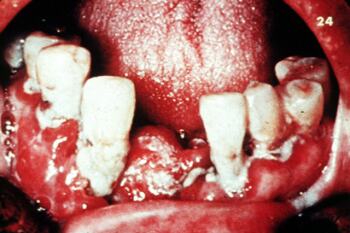
Publisher:
Bonnie King
CONTACT:
Newsroom@Salem-news.com
Advertising:
Adsales@Salem-news.com

~Truth~
~Justice~
~Peace~
TJP
Nov-17-2006 13:01

 TweetFollow @OregonNews
TweetFollow @OregonNews
New Report Finds Serious Oral Disease Problem in Oregon
Salem-News.comTobacco use and excessive alcohol use accounts for approximately 75 percent of all oral cancer in Oregon.
 This patient presents with what looks like severe periodontitis and marked hyperplasia and inflammation of the gingiva. Unfortunately, squamous carcinoma often mimics common inflammatory gingival disease; one must be on guard to detect such an occurrence. Photo: USC.edu |
(SALEM) - Oral disease is a serious, often overlooked public health problem that affects the majority of Oregonians during their lifetime, according to a new report from the Oregon Department of Human Services Public Health Division.
"The Burden of Oral Disease in Oregon" describes the extent of the problem and its consequences, and offers strategies for improvement.
"Mounting evidence shows that a healthy mouth is a reflection of a person's health and is vitally important to their overall well-being," said Gordon Empey, D.M.D, M.P.H., state dental director in DHS. "Yet far too many people suffer from oral disease, which is mostly preventable and always controllable."
Empey noted that untreated oral disease leads to poor nutrition, disabling pain and lowered productivity, and is associated with increased risk of chronic health conditions such as heart disease and pneumonia.
The report presents a sobering perspective of oral disease in Oregon.
Some highlights:
• Recent pilot projects targeting lower income Oregon preschoolers found that between 6 percent and 25 percent of children seen had tooth decay. • Fifty-six percent of Oregon children ages 6 to 8 have had tooth decay; 24 percent have untreated tooth decay. • Seventy-three percent of Oregon 11th graders report having had at least one cavity. • One in five Oregonians between ages 65 and 74 have lost all their natural teeth. • Oral disease takes a heavier toll among minority racial and ethnic groups and low-income residents. • Tobacco use and excessive alcohol use accounts for approximately 75 percent of all oral cancer in Oregon.
"Oregon is falling short when it comes to oral disease prevention," said Empey. He pointed to four findings:
• Fewer than half of pregnant women visited a dentist during pregnancy. Evidence shows that poor oral health during pregnancy may lead to poor birth outcomes. • Only 20 percent of Oregon community water systems are adjusted to provide fluoride, which is shown to be an effective and inexpensive way to prevent tooth decay. • Fewer than half of children age 8 have received dental sealants, a plastic coating that is applied to permanent molar teeth to seal out decay. • Twenty-two of Oregon's 36 counties have a shortage of dental professionals.
Empey said the report is intended as a call to action, although it points to proven strategies such as dental exams for pregnant women, fluoride treatments, dental sealants and regular dental visits for everyone.
Future goals include obtaining more data to better understand the problem, securing stable funding and expanding oral health services across the state.
"This is a sobering assessment and the price of doing nothing is high – treating oral disease can cost up to 73 times more than preventive programs," said Empey. "Oregon is beginning to make some strides in this area, but the solution calls for collaboration among government, private industry, non-profits, consumer groups, health professionals, educators and others."
The DHS Public Health Division operates a fluoride supplement program in 250 elementary schools across the state and more than 30 schools participate in dental sealant programs.
Federal funds received in 2002 enabled the division to begin building a program to confront oral disease. A state plan was presented at the first-ever statewide oral health forum last May; a statewide oral health coalition has been convened with representation from public and private organizations interested in reducing the burden of oral disease in Oregon.
The oral health program is one of many in the DHS Public Health Division that helps prevent disease and improve the health of all Oregonians. Partial funding for the report came from the federal Centers for Disease Control and Prevention.
Articles for November 16, 2006 | Articles for November 17, 2006 |

googlec507860f6901db00.html
Salem-News.com:



Terms of Service | Privacy Policy
All comments and messages are approved by people and self promotional links or unacceptable comments are denied.
Amanda November 18, 2006 4:40 pm (Pacific time)
If photos like that were shown to kids before they were old enough to smoke... maybe at least the vain ones wouldn't get into the habit.
Jason from MN November 18, 2006 7:49 am (Pacific time)
If you want to fight dental problems like decay and the like, don't expect FLUORIDE to be a magic cure-all. Think about it this way...Kentucky and West Virginia are 2 of the most fluoridated states in the country. Enough said!
Henry Ruark November 18, 2006 3:09 am (Pacific time)
To all: Image-choice,too, is part of responsible journalism where demanded. If this one painful, relay that strong revulsion to those responsible for the tobacco and alcohol "trade"...they need to know this end of the bargain. Don't forget, either, many so stricken have little or no health care, thus end up eventually dependent on society (read: taxpayer). IF you own stock in company- perpetrators, you share in responsibilities.
Anonymous November 18, 2006 1:29 am (Pacific time)
I agree, nasty!!!!
Albert Marnell November 18, 2006 1:08 am (Pacific time)
I don't think that they could have found a more disgusting picture. Who ever pick it obviously has a good eye for the grotesque.
[Return to Top]©2025 Salem-News.com. All opinions expressed in this article are those of the author and do not necessarily reflect those of Salem-News.com.